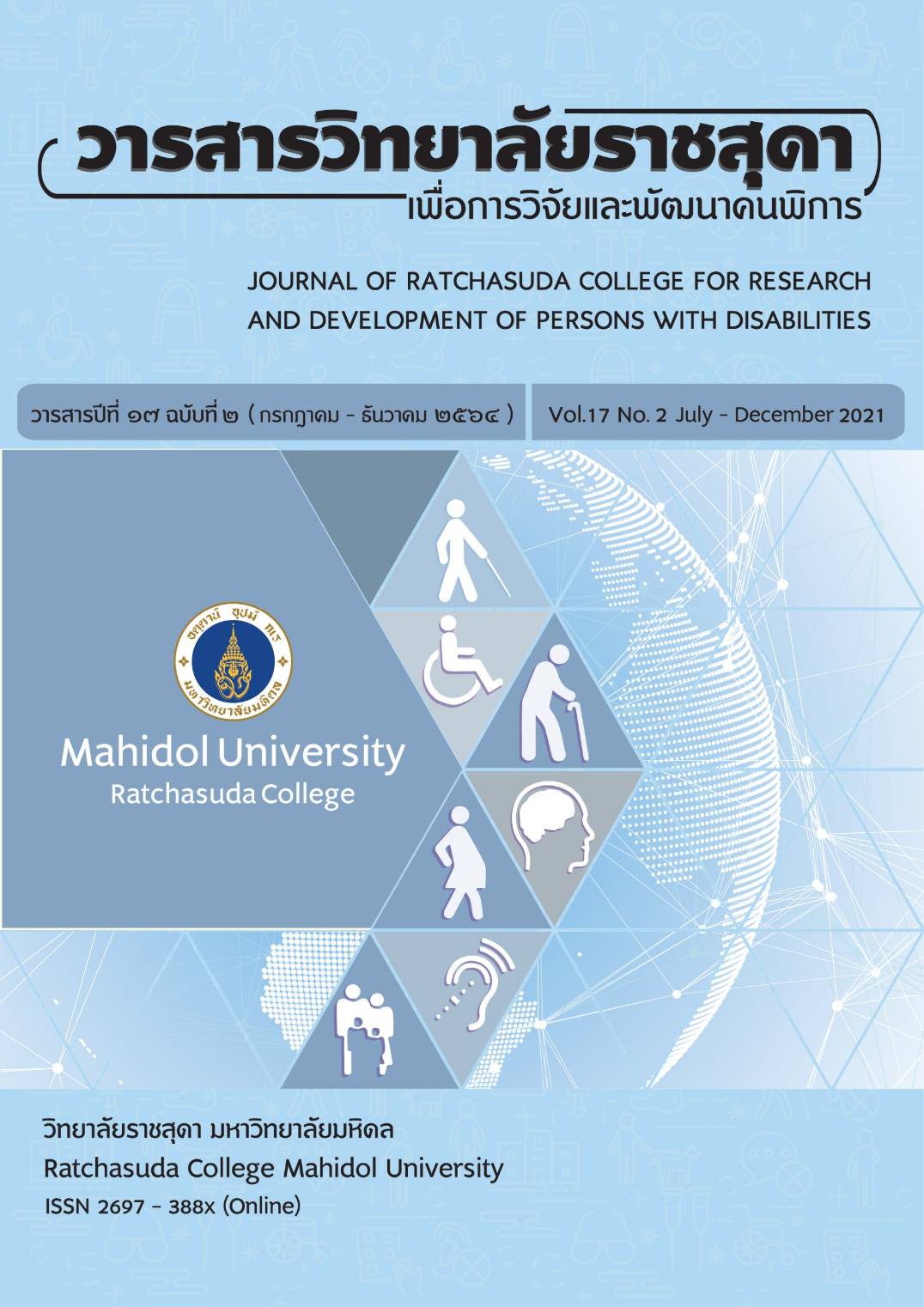Developing Prototype of Student Support and Development System for Inclusive Schools
Keywords:
Student Support and Development System, Inclusive Education, Inclusive SchoolAbstract
This study aims to develop a prototype of “student support and development system for inclusive schools”. Mix-methodology was applied to investigate how to create the prototype. There were 2 phases of the study. In Phase 1, the guideline of student support and development system for inclusive schools was developed and implemented in two schools as a trial phase. In Phase 2, the data from the previous stages was synthesized, and the expert panel was conducted to compile recommendations before the prototype of student support and development system for inclusive schools was created. The research found that the scores on school readiness in inclusive practices of both schools were increased after implemented the guideline. Furthermore, it was found that the prototype of student support and development system for inclusive schools should consist of 3 components. The first component was 6 key factors (inputs) including 1) teaching and learning procedures, 2) resources and data management, 3) support and intervention procedures, 4) students’ engagement in school, 5) collaboration, and 6) teachers’ professional development. The second component (process) was Multi-Tiered System of Support approach comprising of Tier 1–supports for general education students; Tier 2–supports for at-risk students; and Tier 3–supports for students with special needs. The last component was the success indications (outputs) which include 1) students’ outcomes and 2) school personnel outcomes.
Downloads
References
Amornpaisarnloet, W. (2020). Translating national policies to school-wide practices. In Oxford Research Encyclopedia of Education. Umesh, S (ed). New York: Oxford University Press, forthcoming. Retrieved from https://doi.org/10.1093/acrefore/9780190264093.013.ORE_EDU-01206.R1
Barnes, A. C., & Harlacher, J. E. (2008). Clearing the confusion: Response-to-intervention as a set of principles. Education and Treatment of Children, 31(3), 417-431 Retrieved from https://www.jstor.org/stable/42899986
Burns, M. K., & Ysseldyke, J. E. (2009). Reported prevalence of evidence-based instructional practices in special education. The Journal of Special Education, 43(1), 3-11. Retrieved from https://doi.org/10.1177/0022466908315563
Cook, B. G., & Odom, S. L. (2013). Evidence-based practices and implementation science in special education. Exceptional Children, 79(2), 135-144. Retrieved from https://doi.org/10.1177/001440291307900201
Fixsen, D., Blase, K., Metz, A., & Van Dyke, M. (2013). Statewide implementation of evidence-based programs Exceptional children, 79(2), 213-230. Retrieved from https://doi.org/10.1177/001440291307900206
Fixsen, D. L., Blase, K. A., Naoom, S. F., & Wallace, F. (2009). Core implementation components. Research on social work practice, 19(5), 531-540. Retrieved from https://doi.org/10.1177/1049731509335549
Fletcher, J. M., Lyon, G. R., Fuchs, L. S., Barnes, M. A., Stuebing, K. K., Francis, D. J., Olson, R. K., Shaywitz, S. E., & Shaywitz, B. A. (2002). Classification of learning disabilities: An evidence-based evaluation. In R. Bradley, L. Danielson, & D. P. Hallahan (Eds.), Identification of learning disabilities: Research to practice (pp.185-250). Retrieved from https://doi.org/10.1002/pits.10181
Fletcher, J. M., & Vaughn, S. (2009). Response to intervention: Preventing and remediating academic difficulties. Child Development Perspectives, 3(1), 30–37. Retrieved from http://doi.org/10.1111/j.1750-8606.2008.00072.x
Gischlar, K. L., Keller-Margulis, M., & Faith, E. L. (2018). Ten Years of Response to Intervention: Trends in the School Psychology Literature. Contemporary School Psychology, 1-10. Retrieved from https://doi.org/10.1007/s40688-018-0179-9
Harlacher, J. E., Sakelaris, T. L., & Kattelman, N. M. (2014). Multi-tiered system of support. In Practitioner’s guide to curriculum-based evaluation in reading (pp. 23-45). Springer New York.
Horner, R. H., Kincaid, D., Sugai, G., Lewis, T., Eber, L., Barrett, S., Dickey, C. R., Richter, M., Sullivan, E., Boezio, C., Algozzine, B., Raynolds, H., & Algozzine, B. (2014). Scaling up school-wide positive behavioral interventions and supports: Experiences of seven states with documented success. Journal of Positive Behavior Interventions, 16(4), 197–208. Retrieved from https://doi.org/10.1177/1098300713503685
Kantavong, P., & Kiettikunwong, N. (2020). Different paths for inclusion in Thailand: improving special teachers as leaders in the development of inclusive education. Journal of Research in Special Educational Needs, 20(1), 74-84. Retrieved from https://doi.org/10.1111/1471-3802.12467
Kurth, J. A., Lyon, K. J., & Shogren, K. A. (2015). Supporting students with severe disabilities in inclusive schools: A descriptive account from schools implementing inclusive practices. Research and Practice for Persons with Severe Disabilities, 40(4), 261-274. Retrieved from https://doi.org/10.1177/1540796915594160
Loreman, T. (2014). Measuring inclusive education outcomes in Alberta, Canada. International Journal of Inclusive Education, 18(5), 459-483. Retrieved from https://doi.org/10.1080/13603116.2013.788223
Loreman, T., Forlin, C., & Sharma, U. (2014). Measuring indicators of inclusive education: A systematic review of the literature. Measuring inclusive education, 3, 165-187. Retrieved from https://doi.org/10.1108/S1479-363620140000003024
Pivik, J., Mccomas, J., & Laflamme, M. (2002). Barriers and facilitators to inclusive education. Exceptional Children, 69(1), 97-197. Retrieved from https://doi.org/10.1177/001440290206900107
Ruijs, N. M., Van der Veen, I., & Peetsma, T. T. (2010). Inclusive education and students without special educational needs. Educational Research, 52(4), 351-390. Retrieved from https://doi.org/10.1080/00131881.2010.524749
Sailor, W., McCart, A. B., & Choi, J. H. (2018). Reconceptualizing inclusive education through multi-tiered system of support. Inclusion, 6(1), 3-18. Retrieved from https://doi.org/10.1352/2326-6988-6.1.3
Special Education Bureau. (2017). Guidelines for assessing quality according to the inclusive learning standard to internal quality assurance of educational institutions. Bangkok : National Office Of Buddhism.
Sugai, G., & Horner, R.H. (2009). Responsiveness-to-Intervention and School-Wide Positive Behavior Supports: Integration of Multi-Tiered System approaches. Exceptionality, 17(4). 223-237. Retrieved from https://doi.org/10.1080/09362830903235375
Tantixalerm, C. (2014). Effects of Individualized Education Program and behavior on behavior in classroom of primary students with learning disabilities. Bangkok : Faculty of Education Chulalongkorn university.
Tantixalerm, C. (2017). Response to Intervention (RTI): Principles, core components, and practical implications for promoting inclusive education practices in Thailand. Journal of Research Methodology, 30(2). 127-171.
Thompson, A. M., & Cox, T. (2016). Multi-Tiered Systems of Support. School Social Work: National Perspectives on Practice in Schools, 133.
Wapling, L. (2016). Inclusive education and children with disabilities: Quality education for all in low and middle income countries. CBM, 3. Retrieved from https://www.cbm.org/fileadmin/user_upload/Publications/Quality_Education_for_All_LMIC_Evidence_Review_CBM_2016_Full_Report.pdf
UNESCO. (2000). Final report of World Education Forum, Dakar, Senegal, 26-28 April 2000. UNESCO. Retrieved from https://unesdoc.unesco.org/ark:/48223/p
Downloads
Published
How to Cite
Issue
Section
License
Copyright (c) 2021 JOURNAL OF RATCHASUDA COLLEGE FOR RESEARCH AND DEVELOPMENT OF PERSONS WITH DISABILITIES

This work is licensed under a Creative Commons Attribution-NonCommercial-NoDerivatives 4.0 International License.
บทความที่ได้รับการตีพิมพ์เป็นลิขสิทธิ์ของวารสารสถาบันราชสุดาเพื่อการวิจัยและพัฒนาคนพิการ






